The RBI Grade B Preparation Strategy 2026 is crucial for aspirants targeting one of the most respected officer-level positions in the banking sector. The exam demands strong conceptual clarity, analytical thinking, and consistent answer-writing skills across multiple phases. A step-by-step preparation approach helps candidates manage the vast syllabus without feeling overwhelmed.
RBI Grade B Preparation Strategy 2026
The RBI Grade B Exam 2026 is structured into two important phases. Phase I tests your speed and accuracy in areas like Quantitative Aptitude, Reasoning, English Language, and General Awareness. Phase II goes deeper, assessing your knowledge of Economic and Social Issues, Finance and Management concepts, along with English Writing Skills.
Exam Pattern for RBI Grade B 2026
Before diving into the preparation strategy, understanding the RBI Grade B exam pattern in detail helps aspirants design a focused preparation strategy. The RBI Grade B exam is conducted in multiple phases, each designed to test different skill sets and competencies required for an officer-level role.
Phase I: Preliminary Examination
This phase is objective in nature and serves as a screening stage for Phase II.
- The exam consists of sections such as General Awareness, Quantitative Aptitude, Reasoning, and English Language.
- Questions are objective-type with sectional time limits, making time management extremely important.
- Marks obtained in Phase I are used only for shortlisting candidates for Phase II.
- Accuracy and speed play a key role in clearing this phase due to high competition.
Phase II: Main Examination
Phase II tests in-depth knowledge and analytical ability through both objective and descriptive papers.
- It includes papers on Economic & Social Issues (ESI), Finance & Management (FM), and English (Writing Skills).
- ESI and FM are a mix of objective and descriptive questions, while English is purely descriptive.
- Conceptual clarity, current awareness, and answer structure are critical for scoring well.
- Marks obtained in Phase II are counted for final selection.
Phase III: Interview
The final stage assesses personality, communication skills, and suitability for the officer role.
- Candidates are evaluated on subject knowledge, confidence, and awareness of economic and financial issues.
- The interview carries significant weight in the final merit list.
- A balanced performance across Phase II and the interview is essential for final selection.
RBI Grade B Section-wise Preparation Strategy 2026
Explore the detailed section-wise RBI Grade B Preparation 2026 guide below to plan your studies efficiently and maximize your chances of success.
RBI Grade B Preparation Strategy For Quantitative Aptitude
Quantitative Aptitude is a scoring and crucial section in the RBI Grade B Phase I exam, carrying 30 marks. A strong command over this section can give you an edge, even if other areas are challenging. With the right approach, consistent practice, and smart shortcuts, aspirants can maximize their accuracy and speed to secure valuable marks in the prelims.
- Quantitative Aptitude holds a weightage of 30 marks in the RBI Grade B Phase I Exam.
- If arithmetic poses a challenge, focus on practising Data Interpretation (DI) and number series questions, which can yield significant marks in the prelims exam.
- Engage in daily quizzes for RBI Grade B on platforms like our Adda247 app to enhance speed and proficiency.
- Take mock tests regularly, including both sectional mocks and full-length mocks, to gauge the preparation level.
- Improve calculation speed by memorizing tables up to 30, square roots, and cube roots, which can aid in quick problem-solving during the exam.
RBI Grade B Preparation Strategy For Reasoning
Reasoning is one of the most important sections in the RBI Grade B Phase I exam, carrying 60 marks. It tests logical thinking, analytical ability, and problem-solving speed. With regular practice, strategic question selection, and consistent mock tests, aspirants can strengthen their reasoning skills, build confidence, and easily clear the sectional cutoff.
- The reasoning section carries a weightage of 60 marks in the RBI Grade B Phase I Exam.
- Practice is crucial for excelling in reasoning. Begin by building confidence in solving questions related to Syllogism, coded inequalities, direction and distance, and data sufficiency.
- During mock tests, avoid rushing into puzzles immediately. Instead, start with questions on syllogism, inequality, and direction & distance to boost confidence and clear the sectional cutoff.
- Participate in daily quizzes available on platforms like the Adda247 app to reinforce reasoning skills.
RBI Grade B Preparation Strategy For English Language
The English Language section in the RBI Grade B Phase I exam tests comprehension, vocabulary, and grammar skills. Developing a daily reading habit, especially through newspapers and articles, can greatly improve understanding and speed. Coupled with regular practice and mock tests, this approach helps aspirants tackle reading comprehension, cloze tests, and sentence rearrangement questions with confidence.
- Daily reading habits can significantly aid in tackling reading comprehension, cloze tests, and sentence rearrangement sections.
- Dedicate at least one hour to reading newspapers daily to enhance comprehension and vocabulary.
- Take advantage of mock tests available on the Adda247 app, which offer detailed explanations to help to understand.
RBI Grade B Preparation Strategy For General Awareness
General Awareness is a high-scoring and vital section in the RBI Grade B exam, accounting for 40% of the total marks. It covers a broad range of topics, including Banking & Financial Awareness, monetary policies, economic developments, government schemes, and current affairs. Consistent preparation, focused revision, and reliance on a few trusted sources are key to mastering this section.
- General Awareness carries significant weightage, constituting 40% of the total marks in the RBI Grade B exam.
- The section encompasses a wide array of topics including Banking & Financial Awareness, Monetary policies, economic terms, current affairs, Financial & economic issues, Static GK, Government Schemes, Banking terms, rates, and processes.
- It’s crucial to cover current affairs for at least 6 months prior to the exam. Focus on budget analysis, growth forecast predictions by various institutions, Fund allocation by the World Bank and IMF to various states, Committees, and reports, including their chairman and the reason for the appointment.
- Avoid the common mistake of gathering study material from numerous sources, which may hinder effective revision before the exam. Stick to one or two reliable resources for GA preparation.
- Read the newspaper on a daily basis, and utilize monthly current affairs capsules available for free on platforms like our adda247 app and website.
- After completing the monthly current affairs capsule, reinforce the knowledge by going through one-liner current affairs to assess retention.
- Prioritize revision to ensure coverage of all essential topics before the exam.
RBI Grade B Preparation Strategy For Economic and Social Issues
The Economic and Social Issues section in RBI Grade B Stage II evaluates your understanding of key economic concepts and social development at both national and international levels. A good grasp on macroeconomics, microeconomics, public finance and social issues. Making short notes, diagrams and mind maps as well as solving previous years question papers can help candidates revise and improve time management for the exam.
- Focus on current economic and social issues at both national and international levels.
- Master key concepts and theories in macroeconomics, microeconomics, public finance, international economics, and social issues such as poverty, inequality, and sustainable development.
- Create handy notes, diagrams, and mind maps for effective revision.
- Solve previous years’ question papers to understand the exam pattern and improve time management.
RBI Grade B Preparation Strategy For General Finance and Management
- Cover fundamental concepts and theories in finance, management, accounting, and corporate governance.
- Analyze questions from previous year exams, emphasizing topics like financial markets, banking systems, financial management, risk management, HR management, organizational behavior, and strategic management.
- Understand the regulatory framework in the financial sector, including the roles of RBI, SEBI, and other regulatory bodies.
- Strengthen understanding by solving numerical problems and case studies.
- Practice mock tests within the allotted time to enhance speed and accuracy.
RBI Grade B Preparation Strategy For English (Writing Skills)
- Enhance writing skills, grammar, vocabulary, and comprehension abilities.
- Develop a routine for practicing various types of essay writing, including descriptive, argumentative, and persuasive essays.
- Practice formal and informal letter writing, precis writing, and report writing.
RBI Grade B Preparation Tips for Interview
Preparing for the RBI Grade B Interview requires the proportions of knowledge, confidence and communication skills. For the Interview day, the candidate must choose the attire carefully, opting for professional and formal clothing that reflects professionalism. Here are some interview tips mentioned below.
- Know Your Resume: Be prepared to discuss your educational background, work experience, achievements, and any other relevant information mentioned in your resume.
- Develop Soft Skills: Work on improving your communication skills, body language, and overall demeanour. Practice speaking confidently, maintaining eye contact, and expressing your thoughts concisely
- Prepare for Behavioral Questions: Anticipate behavioural questions that assess your problem-solving abilities, leadership skills, and teamwork experience. Prepare examples from your past experiences that demonstrate your competencies and achievements.
- Brush Up on Technical Knowledge: Review core concepts in economics, finance, banking, and current affairs related to the RBI’s functions. Be prepared to discuss topics such as inflation, fiscal policy, financial markets, and regulatory frameworks.
- Stay Calm and Confident: On the day of the interview, stay calm, composed, and confident. Dress professionally, arrive early, and greet the interviewers with a firm handshake and a smile. Listen attentively to questions, take your time to respond thoughtfully, and ask for clarification if needed.
- Practice Mock Interviews: Conduct mock interviews with friends, family, or mentors to simulate the interview experience. Practice answering common interview questions, such as why you want to join the RBI, your understanding of economic indicators, and your views on monetary policy.
Important RBI Grade B Notifications & Updates
A key aspect of RBI Grade B preparation is staying updated with official notifications and announcements. The RBI usually releases the exam notification in the third quarter of the year, so aspirants should keep an eye out around June/July 2026 or onward for official updates regarding application dates, eligibility criteria, exam schedules, and other important instructions. Regularly checking the RBI website and trusted platforms like Adda247 ensures you don’t miss any critical updates, helping you plan your preparation and application process efficiently.
| Related Posts: | |
| RBI Grade B Salary | RBI Grade B Selection Process |
| RBI Grade B Eligibility | RBI Grade B Previous Year Papers |
| RBI Grade B Cut Off | RBI Grade B Mock Test |

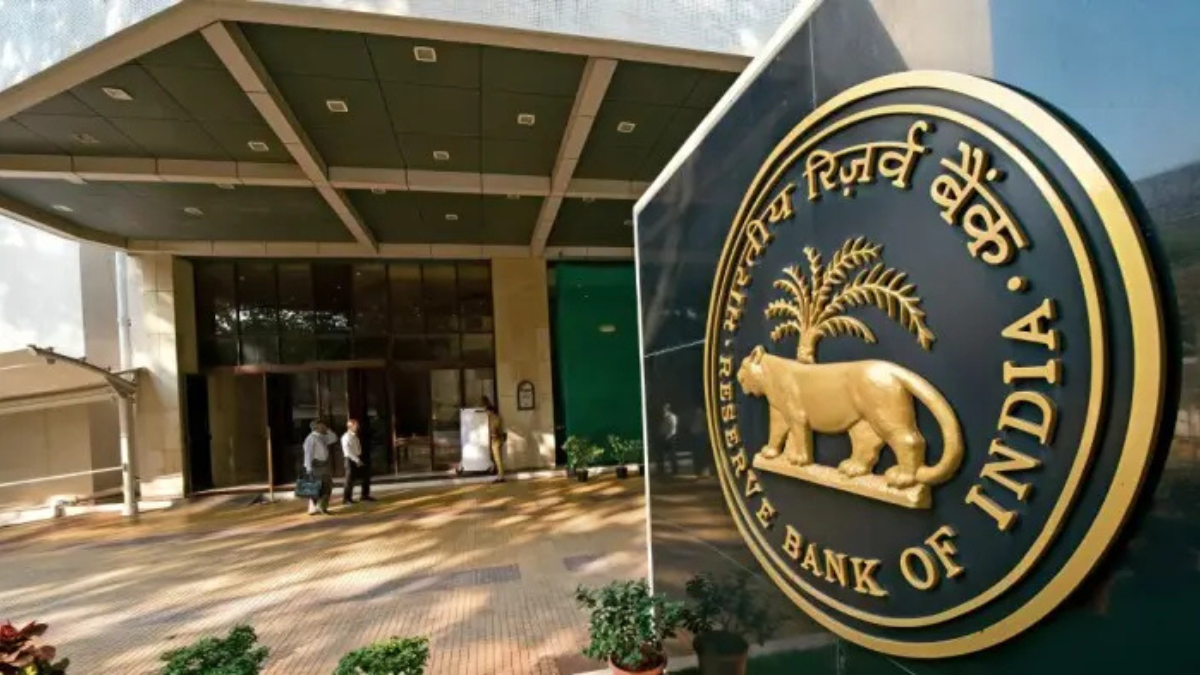
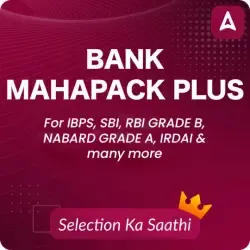

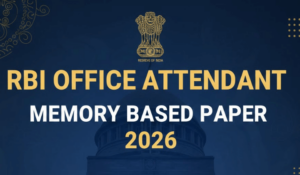 RBI Office Attendant Memory Based Paper ...
RBI Office Attendant Memory Based Paper ...
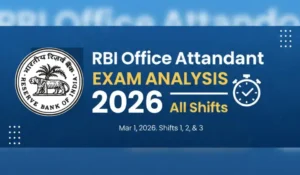 RBI Office Attendant Exam Analysis 2026,...
RBI Office Attendant Exam Analysis 2026,...
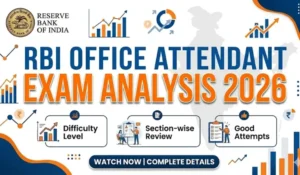 RBI Office Attendant Exam Analysis 2026,...
RBI Office Attendant Exam Analysis 2026,...








